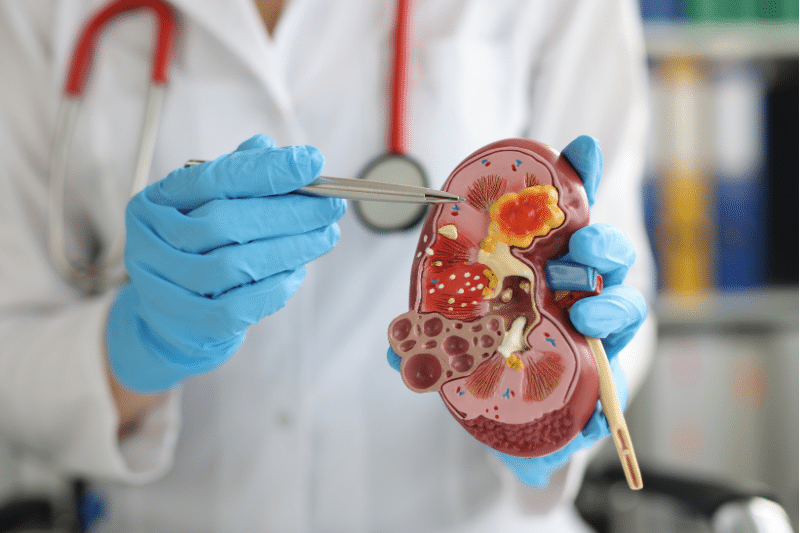Crohn’s disease is a chronic inflammatory bowel disease (IBD) that affects millions worldwide. This guide covers everything from the basics and causes to symptoms, diagnosis, treatment, and management.
Crohn’s Disease Overview
What is Crohn’s Disease?
Crohn’s is an inflammatory bowel disease that causes inflammation of the digestive tract. Moreover, this can affect any part of the gastrointestinal (GI) tract from mouth to anus.
While anyone can develop Crohn’s disease, certain groups, such as those of northern European or Ashkenazi descent, are at higher risk. But it most commonly affects the small intestine and the beginning of the large intestine. Therefore, the inflammation of Crohn’s can cause a range of symptoms and complications that can impact your daily life.
How Serious is Crohn’s Disease?
Crohn’s is a serious condition because of its chronic nature and potential to cause serious health complications. It’s not usually life-threatening but can severely impact your quality of life. The severity of Crohn’s varies greatly; some people may have mild symptoms while others may have severe and debilitating complications.
People with Crohn’s disease can experience varying degrees of severity and impact on their daily lives, requiring different treatment approaches and support systems.
According to the Crohn’s & Colitis Foundation, as of 2024, 780,000 Americans have Crohn’s. Globally Crohn’s is more prevalent in North America and Europe than in other regions so it’s a big deal worldwide.

Crohn’s Disease – Causes, Risk Factors, and Triggers
What are the Causes and Risk Factors?
We don’t know the exact cause of Crohn’s Disease. But research suggests it’s a combination of genetic, environmental, and immune system factors. For instance, the key risk factors are:
-
Genetics – Family history plays a big role. If you have a first-degree relative with Crohn’s Disease you are at higher risk. Studies show genetic predisposition is a major factor in the disease.
-
Immune System An abnormal immune response is thought to be a key player. The immune system may attack healthy cells in the digestive tract and cause inflammation and symptoms of Crohn’s Disease.
-
Environmental Factors – Certain environmental factors can trigger Crohn’s Disease. Smoking is a known trigger that makes the condition worse and increases the risk of developing Crohn’s disease. Diet and use of nonsteroidal anti-inflammatory drugs (NSAIDs) can also impact disease progression.
What Can Trigger a Crohn’s Flare-Up?
Several things can trigger a Crohn’s flare-up and cause Crohn’s disease symptoms to worsen suddenly. Common triggers that develop Crohn’s disease that ease symptoms are:
-
Stress – Emotional stress is known to make symptoms worse but not the cause of Crohn’s Disease. Managing stress through relaxation techniques and therapy can help prevent flare-ups.
-
Infections – Gastrointestinal infections can trigger inflammation and worsen symptoms in people with Crohn’s Disease.
-
Diet – Certain foods can trigger symptoms in some people. High-fat, high-fiber, or spicy foods are often reported as common triggers.
-
Medications – NSAIDs and antibiotics can make Crohn’s Disease worse and cause more symptoms and complications.
What Foods Trigger Crohn’s Symptoms?
Triggers vary from person to person but common foods that can trigger Crohn’s symptoms are:
-
Dairy – Many people with Crohn’s are lactose intolerant so dairy is a common trigger.
-
High Fibre Foods – Raw fruits, vegetables, and whole grains can irritate the gut and make symptoms worse.
-
Spicy Foods – Spices and hot foods can make some people’s guts uncomfortable.
Can You Get Crohn’s Suddenly?
Crohn’s usually develops gradually with symptoms of Crohn’s disease becoming apparent over time. But it can become acute suddenly especially if the disease has been developing subclinically. Early symptoms of Crohn’s disease can be subtle and a sudden worsening of these symptoms can lead to a diagnosis of Crohn’s.

Symptoms and Complications
What are the Symptoms?
Crohn’s disease symptoms can vary and symptoms range from person to person but commonly are:
Abdominal Pain
Cramping and discomfort are common symptoms and can be a more severe disease during flares.
Diarrhea
Frequent watery stools are a hallmark of Crohn’s and can lead to dehydration.
Weight Loss
Poor nutrient absorption and loss of appetite can cause significant weight loss.
Fatigue
Chronic inflammation and nutrient deficiencies can cause tiredness.
What are the Complications?
Complications of Crohn’s can be serious and include:
Intestinal Blockages
Scar tissue from chronic inflammation can block the intestines and cause pain and nausea.
Fistulas
Abnormal connections between different parts of the digestive tract or other organs can become fistulas, fissures, or cysts. Eventually develops and needs surgery.
Nutritional Deficiencies
Inflammation can cause malabsorption of essential nutrients and lead to vitamin and mineral deficiencies.
What Does a Crohn’s Flare Feel Like?
A Crohn’s flare can be pretty nasty and cause intense abdominal pain, more severe diarrhea, and potentially fever.
Symptoms can vary depending on where and how much of the small and large intestine is inflamed. During a flare, you’ll notice a big increase in the frequency and severity of your symptoms.
What are the Early Warning Signs of Crohn’s?
Early warning signs of Crohn’s can be subtle but may include:
Persistent Diarrhea
Especially if accompanied by abdominal pain or discomfort.
Unexplained Weight Loss
Losing weight without a reason can be an early indicator.
Fatigue
Feeling tired all the time and it doesn’t go away with rest can be an early symptom.
What Makes Crohn’s Worse?
Several things can make Crohn’s worse:
Smoking
Tobacco use is a proven risk factor for worsening Crohn’s symptoms.
Not Taking Medication As Prescribed
Not following your treatment plan can lead to more frequent and severe flares.
Bad Food Choices
Eating foods and nutritional supplements that trigger symptoms can make the condition worse and worsen symptoms.

Crohn’s Disease – Diagnosis and Treatment
What are the Diagnoses for Crohn’s?
Diagnosing Crohn’s involves a multi-faceted approach:
Medical History and Physical
Initial diagnosis starts with a thorough review of symptoms and a physical exam.
Endoscopy
This allows doctors to see inside the digestive system and assess the degree of inflammation, which is crucial for managing gastrointestinal and liver disease.
Biopsy
Tissue samples taken during endoscopy can confirm Crohn’s.
Imaging
MRI or CT scans can show the digestive tract and identify complications like strictures or fistulas.
What are the Treatments for Crohn’s?
Specifically, treatment for Crohn’s disease focuses on reducing inflammation, managing symptoms, and enhancing overall quality of life. For example, some common treatments include:
Medications
Anti-inflammatory drugs, immunosuppressants, and biologics to manage inflammation and symptoms. It is also important to address related health issues like digestive and kidney diseases in treatment plans, often requiring collaboration with healthcare providers for personalized approaches.
Dietary Changes
Avoiding trigger foods and improving nutrition can be key.
Surgery
In some cases, surgery may be needed to address complications or remove damaged parts of the large and small intestines together.
Does a Gastroenterologist Treat Crohn’s?
Yes, a gastroenterologist is a specialist who treats Crohn’s. Gastroenterologists are experts in inflammatory bowel diseases and can create a personalized treatment plan for you.
What Kind of Doctor is Best for Crohn’s?
A Gastroenterologist is best to diagnose and manage Crohn’s. In some cases, a multidisciplinary team, including dietitians, surgeons, and primary care physicians may be involved to provide care.

Management and Daily Life
How to Manage Crohn’s or Ulcerative Colitis in Daily Life?
Managing and developing Crohn’s disease involves:
Medication Adherence
Taking your meds as prescribed is key to controlling inflammation as well as preventing flares.
Dietary Adjustments
Avoiding trigger foods and eating a balanced diet can help manage symptoms and overall health.
Stress Management
Doing stress-reducing activities such as exercise, meditation, and counseling. Additionally can help reduce the impact of stress on the disease.
Is Crohn’s or Inflammatory Bowel Disease Hard to Live With?
Living with Crohn’s can be tough due to its chronic nature and impact on daily life. Symptoms can affect work, social activities, and overall well-being. But with proper management and treatment, many people can live a fulfilling life.
What is the Life Expectancy of Someone with Crohn’s?
Indeed, with proper treatment and disease management, most people with all types of Crohn’s disease can have a near-normal life expectancy. Similarly, advances in treatment and early diagnosis have improved outcomes.
Studies show that life expectancy for people with severe Crohn’s disease is generally the same as the general population if the Crohn’s disease diagnosis is well-managed.
What Are the Long-term Effects of Crohn’s Disease Related to Digestive Tract?
As a matter of fact, the long-term effects of Crohn’s Disease can be severe infections including:
Increased Risk of Colon Cancer
Chronic inflammation may increase the risk of developing colon cancer. Consequently, regular screenings are recommended.
Nutritional Deficiencies
Ongoing malabsorption can lead to deficiencies in essential vitamins and minerals. Additionally, these deficiencies can potentially impact kidney diseases, highlighting the need for comprehensive treatment plans.
Potential for Surgery
Some individuals may require surgical intervention. To further manage complications or remove affected sections of the intestine.
Does Crohn’s Ever Go Away?
Currently, there is no cure for Crohn’s Disease. However, the goal of treatment is to manage symptoms, induce remission, reduce symptoms, relieve symptoms, treat complications, prevent complications, and improve quality of life. While some individuals may experience long periods of remission, the disease does not typically resolve completely.

Inflammatory Bowel Diseases – Prognosis and Life Expectancy
What is the Life Expectancy of a Person with Crohn’s Disease?
The prognosis for Crohn’s Disease is generally positive with appropriate management. In fact, many individuals with Crohn’s Disease live long, healthy lives, thanks to advancements in treatment and early diagnosis.
Life expectancy for people with Crohn’s Disease is generally similar to that of the general population, provided the disease is well-controlled.
How Serious is Crohn’s?
Crohn’s disease is a serious condition due to its chronic nature and potential complications. However, with modern treatments and management strategies, many people with Crohn’s Disease can effectively manage their symptoms and maintain a good quality of life.
Crohn’s Disease FAQ
What are the Tips for Crohn’s Disease Symptoms?
Crohn’s Disease symptoms management includes:
- Medication – Follow your meds to control inflammation and symptoms.
- Dietary Management – Choose your food wisely to avoid triggers and meet your needs.
- Regular Check-ups – Go for regular appointments to monitor disease activity and adjust treatment as needed.
How do Lifestyle Changes Affect Crohn’s Disease?
Lifestyle changes can make a big difference. Such as:
- Stop Smoking – Quitting can reduce flare-ups.
- Stress – Practice mindfulness and therapy to manage symptoms.
- Balanced Food – Avoid trigger food and meet your needs.
Are There New Crohn’s Disease Treatments in 2024?
As of 2024, there are new treatments and prescription medications. Here are some of the advances:
Biologic Therapies
New biologics target specific parts of the immune system to reduce inflammation.
Targeted Treatments
Research is ongoing into treatments that target specific pathways in Crohn’s Disease.
Personalized Medicine
Advances in genomics and personalized medicine are leading to more tailored approaches.
How Does Stress and Mental Health Affect Crohn’s Disease?
Certainly, stress and mental health have a big impact on Crohn’s Disease. Subsequently, it can trigger flares and make other symptoms worse. However, managing stress through therapy, mindfulness, and support groups can help people with Crohn’s Disease. Thus, mental health is a big part of overall disease management.
Nonetheless, Crohn’s Disease is a complicated condition that needs a whole-of-life approach. Additionally, by understanding the disease, the symptoms, and the treatments individuals can take control. Lastly, consult a healthcare professional for personalized advice and treatment plans. Further, helps manage your condition and improve your life timely.











